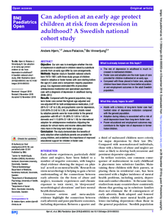Abstract
Objective Our aim was to investigate whether the risk of depression in adulthood in children raised by substitute parents from an early age differ by care arrangements.
Methods Register study in Swedish national cohorts born 1972–1981, with three study groups of children raised in adoptive or foster homes with care starting before the age of 2 years and a comparison majority population group. Cox regression estimated HRs of prescribed antidepressive medication and specialised psychiatric care with a diagnosis of depression in adulthood during 2006–2012.
Results Compared with the general population, long-term foster care carried the highest age-adjusted and sex-adjusted HR for both antidepressive medication, 2.07 (95% CI 1.87 to 2.28), and psychiatric care for depression, 2.85 (95% CI 2.42 to 3.35), in adulthood. Adults raised by adoptive parents were far more similar to the general population with HR of 1.19 (95% CI 1.00 to 1.43) for domestic and 1.13 (95% CI 1.08 to 1.18) for international adoption for antidepressive medication. Adjusting the analysis for school marks and income attenuated these risks more in the long-term foster care group.
Conclusion The study demonstrates the benefits of early adoption when substitute parents are provided for young children, and underlines the importance of improved educational support for children in foster care.

